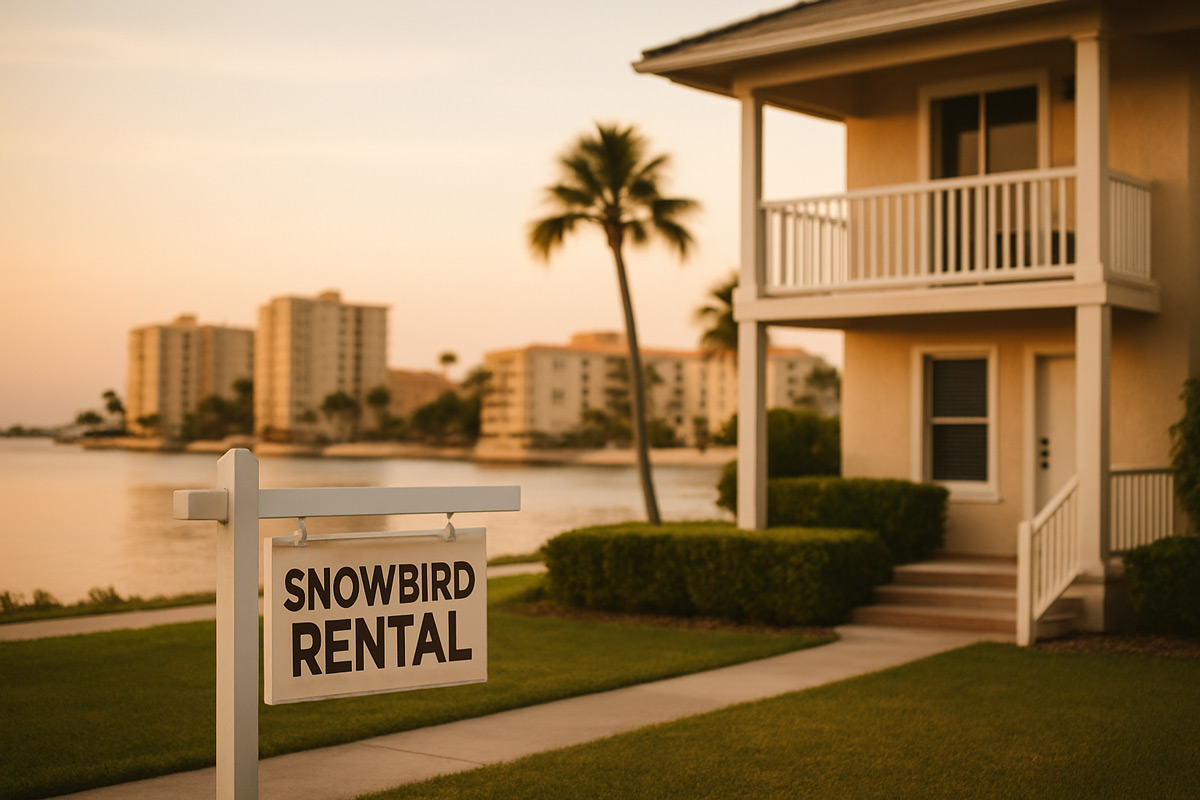
Understanding the Snowbird Economy
Each winter, hundreds of thousands of "snowbirds"—seasonal residents primarily from the Northeast, Midwest, and Canada—flock to Florida to escape the cold. This migration fuels a highly lucrative seasonal rental market from late October through April. For property owners, especially in cities like Naples, Sarasota, Boca Raton, and Fort Myers, this seasonal demand offers a reliable opportunity to boost returns on investment (ROI) through short- to mid-term rentals.
"Snowbirds don't just bring luggage—they bring consistent income potential for landlords who plan ahead," says Jane Doe, a Sarasota-based real estate strategist.
Targeting the Right Markets in Florida
Top Snowbird Cities
While nearly all of Florida sees an influx of winter renters, several regions are particularly popular:
- Sarasota County: High-end rentals and cultural offerings attract older, affluent tenants.
- Palm Beach County: Known for luxury properties and country clubs.
- Lee County (Fort Myers, Cape Coral): Increasing demand from mid-income snowbirds due to affordability.
- Collier County (Naples): Elite retirees seek premium, turnkey accommodations.
- Pinellas County (Clearwater, St. Petersburg): A hotspot for Canadians due to direct flight access.
Each of these areas benefits from strong seasonal tourism infrastructure and typically sees rental rates double—or even triple—during the high season.
Optimizing Rental Strategy for Maximum ROI
1. Furnished Rentals Are a Must
Most seasonal tenants expect fully furnished, move-in-ready homes. This includes not just furniture, but linens, cookware, and even smart TVs and Wi-Fi. Investing in durable furnishings can improve occupancy rates and justify higher rental prices.
2. Minimum 3-Month Terms
In many condo communities across Florida—particularly in counties like Miami-Dade and Broward—HOA rules enforce minimum rental periods of 90 days. These rules are meant to discourage transient traffic but can align well with the snowbird season.
3. Professional Property Management
From key exchanges to maintenance requests, seasonal renters expect hotel-level service. Hiring a property manager who specializes in seasonal rentals, especially in coastal cities like Fort Lauderdale or Bonita Springs, can reduce vacancies and elevate guest satisfaction.
4. Seasonal Pricing Strategy
Use dynamic pricing tools such as AirDNA or Beyond to adjust your rates based on demand trends. Typically:
- October–December: Medium demand, ideal for early bird deals.
- January–March: Peak pricing window, especially around holidays.
- April: End-of-season discounts attract last-minute renters.
Legal Considerations and Tax Implications
Florida law is generally favorable to landlords, but owners must comply with specific short-term rental regulations:
- Sales and Tourist Development Tax: Most counties require collection of both state and local taxes on short-term stays under six months.
- Licensing: Properties rented for under 30 days more than three times a year may require a license from the Florida Department of Business & Professional Regulation.
- HOA Compliance: Condo and homeowners associations often restrict short-term rentals or impose hefty fees and approvals.
"We advise our clients to budget for taxes, association fees, and at least two months of vacancy annually when calculating ROI," says John Smith, a Fort Myers-based investment property accountant.
Marketing Tips That Make the Difference
Professional Photography
Listings with high-quality images perform significantly better. Consider twilight shots of pools or drone footage of waterfront views to capture snowbirds seeking scenic escapes.
Highlight Local Amenities
Proximity to golf courses, beach access, walkability to shops or restaurants—these are key phrases that appeal to seasonal renters. Mention them in both listings and welcome materials.
Use Specialized Platforms
Besides Airbnb and Vrbo, try Florida-centric seasonal platforms like SnowbirdAdvisorRentals.com or SeasonalRentalsFlorida.com to reach your ideal demographic directly.
Financial Benefits and ROI Snapshot
Many property owners report ROI increases of 20–35% annually by shifting from annual leases to seasonal rentals. A two-bedroom condo in Naples that rents for $2,500/month year-round can command $5,000–$6,000/month during peak season.
| Property Type | Annual Lease (Avg) | Seasonal Lease (4 Months) | ROI Uplift |
|---|---|---|---|
| 1BR Condo – Sarasota | $1,900/month | $4,500/month | +28% |
| 2BR Villa – Naples | $2,500/month | $6,000/month | +32% |
| 3BR Home – Fort Myers | $2,800/month | $6,500/month | +30% |
Closing Thoughts
As Florida continues to attract seasonal residents in ever-larger numbers, property owners who adapt to the needs of snowbirds stand to gain significantly. With thoughtful planning, legal compliance, and smart marketing, seasonal rentals can be more than just a side income—they can be a primary profit engine.
Want to make the most of Florida's seasonal rental boom?
Subscribe to Florida Times for more insights, tools, and trend reports.